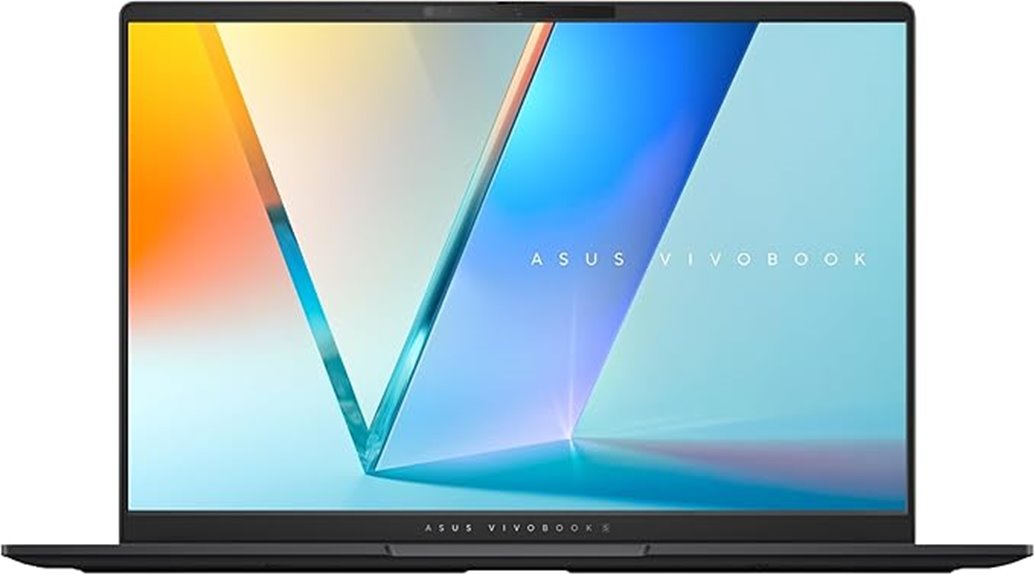Best Laptop for Podcast (Top 5 Picks for 2025)
If you’re looking for the best laptops for podcasting in 2025, consider the Apple 2024 MacBook Pro with M4 chip, Acer Swift X 14, Apple 2025 MacBook Air 15-inch, ASUS Vivobook S 14 OLED, and Samsung Galaxy Book4 Pro. Each laptop offers powerful performance, impressive display quality, and solid battery life for uninterrupted recording sessions. They also have multiple connectivity options, catering to your podcasting needs. Stick around to discover which features matter most for your ideal setup.
In the interest of full disclosure, we would like to inform you that some links on our website are affiliate links. By clicking on these links and completing a purchase from our partners, we may receive a nominal commission at no extra cost to you. Rest assured, our affiliate partnerships do not compromise the integrity of our editorial content or product evaluations. For further clarification, kindly refer to our comprehensive affiliate disclosure.
Table of Contents
What Are the Best Laptop for Podcast to Buy This Year?
Here are my top picks for the best laptop for podcast you can consider this year.
Apple MacBook Pro Laptop with M4 Chip
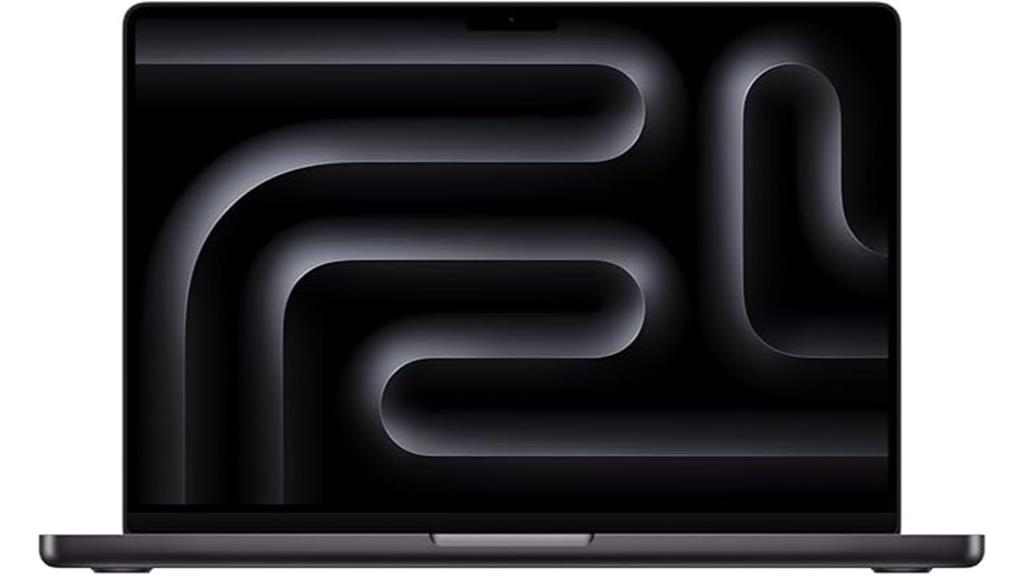
The Apple 2024 MacBook Pro with the M4 chip is an outstanding choice for podcasters who need powerful performance and stunning visuals. With its 10-core CPU and GPU, you can multitask seamlessly while running demanding applications. The 14.2-inch Liquid Retina XDR display, boasting 1600 nits peak brightness, ensures that your video content looks breathtaking. Plus, with 16GB of unified memory and a 512GB SSD, you’ll have ample space and speed for all your projects. The all-day battery life keeps you going, so you can focus on creating without interruptions. It’s a perfect fit for your podcasting needs.
Best For: Podcasters and content creators seeking high performance and exceptional display quality for their projects.
Pros:
- Exceptional performance with M4 chip’s 10-core CPU and GPU for seamless multitasking.
- Stunning visuals on the 14.2-inch Liquid Retina XDR display with peak brightness of 1600 nits.
- Long-lasting battery life that supports all-day productivity without interruptions.
Cons:
- Higher price point compared to other laptops that may not offer such advanced features.
- Limited upgrade options for storage and memory after purchase.
- Compatibility issues may arise with non-Apple software or devices.
Acer Swift X 14 Laptop (SFX14-72G-77NJ)
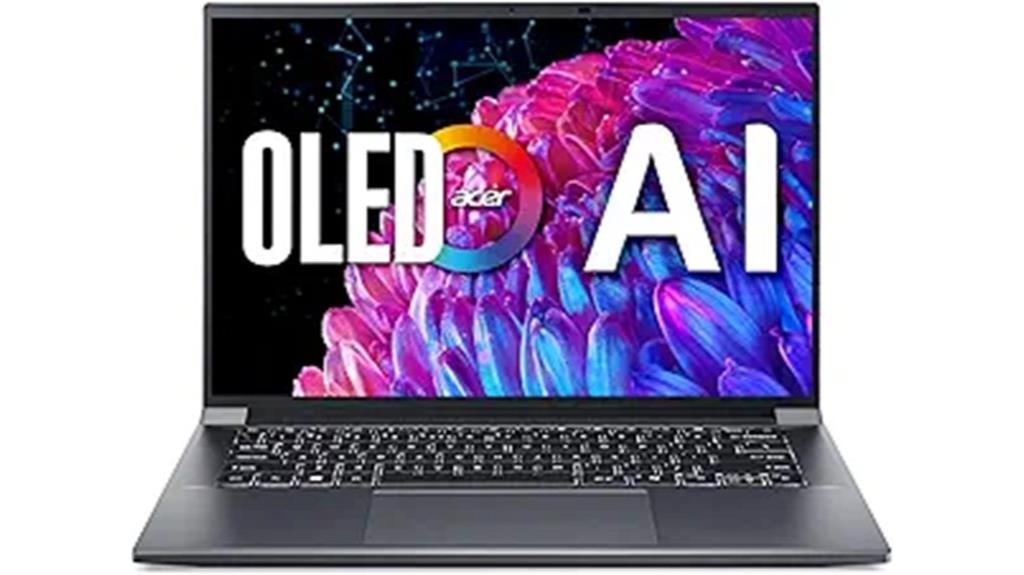
For podcasters seeking a powerful and portable solution, the Acer Swift X 14 Laptop (SFX14-72G-77NJ) stands out with its impressive processing capabilities. Featuring an Intel Core Ultra 7 processor and NVIDIA GeForce RTX 4060 GPU, it handles demanding software smoothly. The vibrant 14.5-inch OLED display ensures your audio editing visuals are crisp and clear. With 16GB of RAM and a 1TB SSD, multitasking becomes effortless. Enhanced AI features, including a dedicated Copilot Key, streamline your workflow. Plus, the 1080p webcam and noise-reducing tech make video calls and collaborations seamless. It’s a solid choice for any serious podcaster.
Best For: Podcasters and creators looking for a powerful, portable laptop that excels in performance, display quality, and AI features.
Pros:
- High-performance Intel Core Ultra 7 processor and NVIDIA GeForce RTX 4060 GPU enable smooth handling of demanding software.
- Vibrant 14.5-inch OLED display with 2880 x 1800 resolution and 120Hz refresh rate provides exceptional visual clarity for editing.
- Advanced collaboration tools, including a 1080p webcam and AI noise reduction, enhance video call quality and teamwork.
Cons:
- The 14.5-inch size may not offer as much screen real estate as larger laptops for some users.
- Higher-end components may lead to a higher price point compared to entry-level models.
- Limited upgrade options due to soldered memory and SSD configurations.
Apple 2025 MacBook Air 15-inch Laptop with M4 Chip
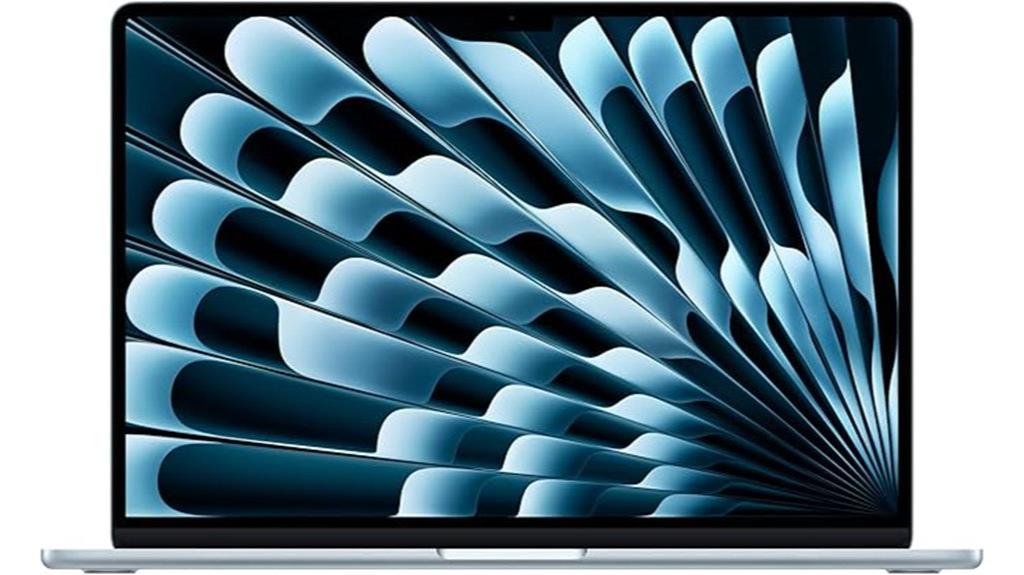
If you’re a podcaster looking for a powerful yet portable laptop, the Apple 2025 MacBook Air 15-inch with the M4 chip is an excellent choice. Its impressive performance allows for seamless multitasking, video editing, and gaming, backed by up to 18 hours of battery life. The stunning 15.3-inch Liquid Retina display showcases vibrant colors and sharp details, perfect for editing your podcast visuals. With a 12MP Center Stage camera, three microphones, and six speakers featuring Spatial Audio, your podcasts will sound and look fantastic. Connectivity options like Thunderbolt 4 ports ensure you stay connected and productive on the go.
Best For: Podcasters seeking a powerful, portable laptop that excels in performance, visuals, and audio quality.
Pros:
- Impressive performance with the M4 chip, allowing for seamless multitasking and video editing.
- Stunning 15.3-inch Liquid Retina display that supports 1 billion colors for vibrant visuals.
- High-quality audio and video capabilities with a 12MP Center Stage camera and Spatial Audio speakers.
Cons:
- Limited to two Thunderbolt 4 ports, which may require additional adapters for multiple peripherals.
- No dedicated graphics card, which might affect performance in high-end gaming or graphic-intensive tasks.
- Higher price point compared to some other laptops in the market, potentially making it less accessible for budget-conscious buyers.
ASUS Vivobook S 14 OLED Slim Laptop (M5406WA-DS76)
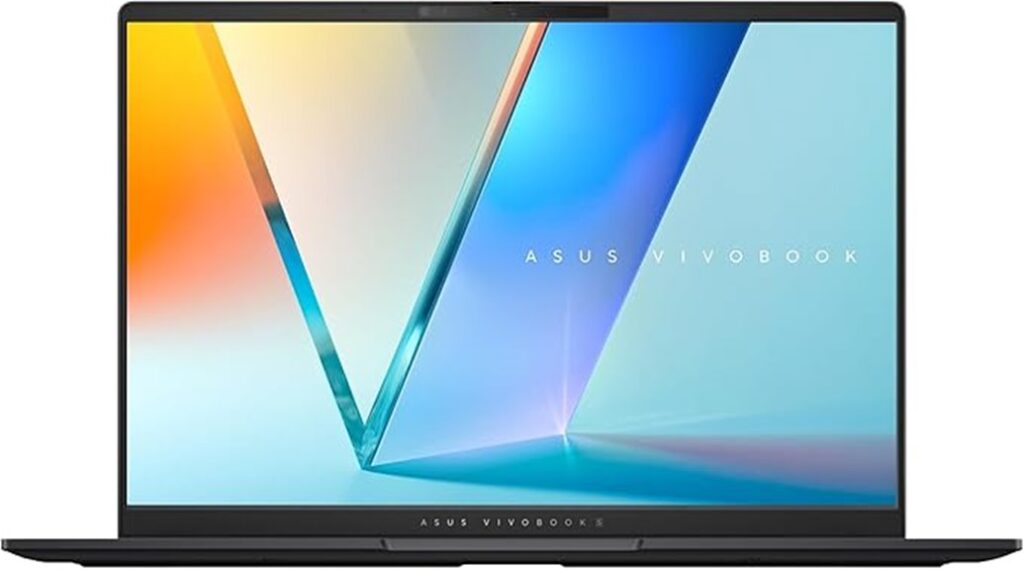
Looking for a laptop that can handle your podcasting needs with ease? The ASUS Vivobook S 14 OLED Slim Laptop (M5406WA-DS76) delivers top-notch performance with its AMD Ryzen 9 365 processor and 24GB RAM, ensuring smooth multitasking. The stunning 14” 3K OLED display offers vibrant colors and a 120Hz refresh rate, perfect for editing audio and video. Weighing just 2.87 lbs and measuring 0.63” thick, it’s incredibly portable. Plus, the customizable RGB backlit keyboard enhances your typing experience. With multiple connectivity options, you’ll stay connected effortlessly, making it an excellent choice for podcasters on the go.
Best For: Podcasters and content creators seeking a high-performance laptop with excellent display quality and portability.
Pros:
- Powerful performance with AMD Ryzen 9 365 processor and 24GB RAM for seamless multitasking.
- Vibrant 14” 3K OLED display with 120Hz refresh rate, perfect for editing and visual content.
- Lightweight and slim design at 2.87 lbs and 0.63” thick, making it easy to carry on the go.
Cons:
- Limited storage with only 512GB SSD, which may require external storage solutions for large projects.
- Single-zone RGB keyboard may not appeal to users looking for more advanced customization options.
- No dedicated graphics card, which could limit performance for graphics-intensive tasks.
Samsung Galaxy Book4 Pro Business Laptop (NP944XGK-KG4US)
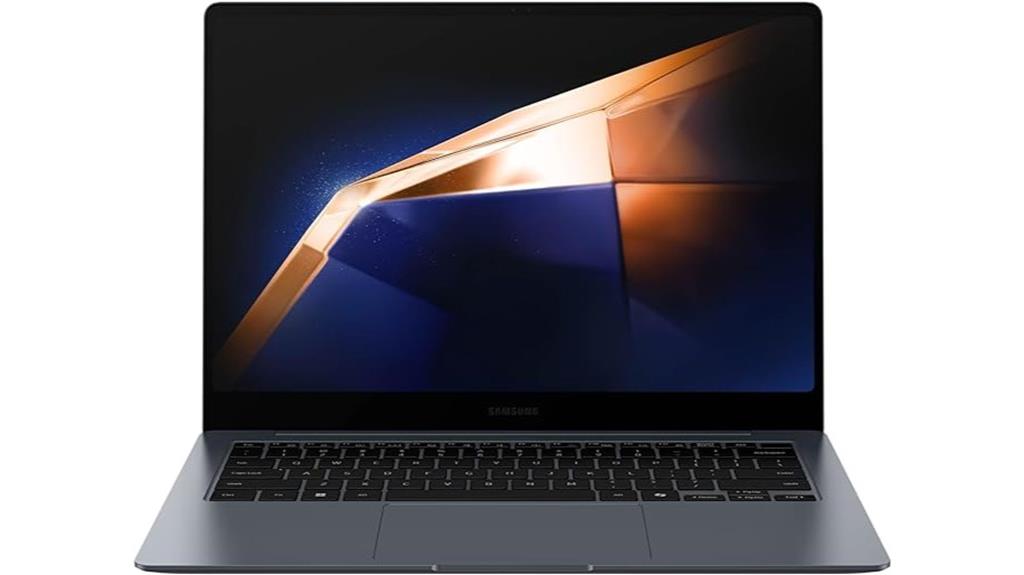
The Samsung Galaxy Book4 Pro Business Laptop (NP944XGK-KG4US) stands out as an exceptional choice for podcasters who need a powerful, portable machine that excels in multitasking. With an Intel Core Ultra 7 processor, 32GB of RAM, and a stunning 14-inch 3K AMOLED touchscreen, it delivers sharp visuals and smooth performance. Weighing just 2.71 lbs, it’s perfect for on-the-go recording sessions. You’ll appreciate the long battery life and fast charging, ensuring you’re always ready. Plus, its robust security features protect your sensitive data, making it a reliable partner in your podcasting journey.
Best For: Professionals and podcasters seeking a lightweight, high-performance laptop with excellent multitasking capabilities and robust security features.
Pros:
- Exceptional display quality with a 14-inch 3K AMOLED touchscreen for vibrant visuals.
- Lightweight and portable design at just 2.71 lbs, ideal for on-the-go use.
- Long battery life with fast charging capability, perfect for extended recording sessions.
Cons:
- Higher retail price ($1749) compared to similar models from competitors.
- Limited RAM upgrade options in certain regions (max 16GB in the US, Canada, and UK).
- Perceived low quality of the OEM SSD from Western Digital for the price point.
READ MORE: Best Laptops for Penetration Testing, Best Laptops for Mechanical Engineering, Best Laptops for Investment Banking, Best Laptops for Insurance Adjusters, Best Laptops for Plc Programming, Best Laptops for Word and Excel, Best Laptops for Social Media Marketing, Best Laptops for Heavy Excel Use, Best Laptops for Spreadsheets, Best Laptops for Freelancing
Factors to Consider When Choosing the Best Laptop for Podcast
When choosing a laptop for podcasting, you need to think about several key factors. Processing power, display quality, battery life, connectivity options, and portability all play a crucial role in ensuring your setup meets your needs. Let’s break down each of these points to find the best fit for your podcasting journey.
Processing Power Requirements
As you dive into podcasting, choosing a laptop with sufficient processing power is essential to ensure smooth production. Look for multi-core processors, like Intel Core Ultra or Apple M series chips, as they’re perfect for multitasking and running demanding audio editing software. A minimum of 16GB of RAM is recommended, allowing you to handle multiple applications seamlessly, especially during intense production sessions. Opt for solid-state drives (SSD) with at least 512GB of storage for quick access to large audio files. If your podcast includes video, consider laptops with dedicated GPUs to boost performance. Lastly, prioritize battery life; select a laptop that offers all-day performance to prevent interruptions during long recording or editing tasks.
Display Quality Importance
Choosing a laptop with excellent display quality can significantly enhance your podcasting experience, especially if you’re incorporating video elements. A high-resolution display, like a 3K or 4K panel, offers sharp visuals that improve the clarity of your recordings and live streams, engaging your audience better. Look for peak brightness levels of 600 nits or more; this ensures your visuals remain vibrant even in bright settings. Additionally, displays with high color accuracy, supporting 100% DCI-P3 color gamut, allow you to produce content that genuinely represents your intended colors. A fast refresh rate, such as 120Hz, minimizes lag during playback, while an anti-reflective screen reduces glare, helping you stay focused during long sessions.
Battery Life Considerations
A high-quality display enhances your podcasting visuals, but it’s equally important to consider battery life for uninterrupted creativity. Aim for a laptop with at least 8 hours of battery life to ensure you can record and edit without constantly seeking an outlet. Look for devices that offer all-day battery performance, letting you work efficiently during long podcasting sessions. Fast charging capabilities are a must, as they provide quick power boosts when you’re pressed for time. Additionally, evaluate the laptop’s power consumption; energy-efficient models can extend battery life, making them ideal for extended tasks. Lastly, prioritize laptops that deliver consistent performance whether plugged in or on battery, ensuring your podcasting tasks run smoothly regardless of your power source.
Connectivity Options Available
When selecting a laptop for podcasting, it’s crucial to prioritize connectivity options that enhance your workflow. Look for laptops with multiple USB ports, including USB-A and USB-C, to connect various audio interfaces and microphones. Thunderbolt 4 ports are a great addition, as they allow high-speed data transfer and connections to external displays or additional storage devices. Don’t forget the importance of a headphone jack for monitoring audio during recordings, ensuring sound quality remains top-notch. Bluetooth connectivity can offer flexibility, letting you connect wirelessly to headphones or microphones. Lastly, make sure the laptop is compatible with podcasting software and applications, so you can run editing tools and audio production software without any hiccups.
Portability and Weight
For podcasters, having a laptop that’s portable and lightweight can make all the difference in capturing content on the go. Portability allows you to easily transport your equipment for recording in various locations, ensuring flexibility. Ideally, look for a laptop weighing under 3 lbs; this enhances your mobility and lets you carry your device without strain. A slim profile, around 0.6 inches thick or less, makes it easier to store in bags or briefcases, keeping your mobile podcasting setup simple. You’ll also want a battery life of at least 8 hours under maximum load to ensure uninterrupted sessions, especially when you’re away from power sources. Lastly, choose laptops with robust build quality to withstand frequent travel and diverse environments.
Operating System Preference
Choosing the right operating system for your podcasting laptop can significantly impact your workflow and overall productivity. Consider the compatibility of the OS with essential audio editing software, as some applications work best on macOS or Windows. Your choice also affects multitasking capabilities, which are crucial when running multiple programs during production. Different operating systems provide varying support for hardware integration, influencing how well your audio interfaces and microphones perform. Additionally, your familiarity with an OS can shorten the learning curve for new software tools, boosting efficiency. Finally, keep in mind the security features and update policies of the operating system, as they play a vital role in protecting your valuable podcast content.
Audio and Video Capabilities
While evaluating laptops for podcasting, audio and video capabilities are crucial factors that can significantly enhance your production quality. Look for a laptop featuring a high-quality webcam, ideally 1080p or better, to ensure your video clarity is top-notch during virtual interviews. Integrated microphones with noise reduction and multiple arrays can greatly improve your audio capture. A display supporting high resolutions like 4K or 3K is essential for professional-looking visuals. Additionally, consider laptops with advanced audio capabilities, such as spatial audio or high-fidelity sound, to elevate your audience’s listening experience. Lastly, connectivity options like Thunderbolt ports facilitate easy integration of external audio interfaces and cameras, boosting your overall production quality significantly.
Brand Ecosystem Compatibility
When you’re diving into podcasting, brand ecosystem compatibility can make a significant difference in your workflow. A laptop that seamlessly integrates with your other devices enhances productivity through features like file sharing and app synchronization. If you’re invested in a specific brand, look for laptops that support iPhone mirroring and text messaging, as this creates a cohesive experience. Selecting a device that works well with tablets and smartphones streamlines your podcast production, giving you easy access to files and applications. Furthermore, ensure your laptop supports popular productivity and creative tools, as well as the latest connectivity options like Thunderbolt or USB-C, for better integration with accessories commonly used in podcasting setups.
Frequently Asked Questions
Can I Use a Tablet for Podcasting Instead of a Laptop?
You can use a tablet for podcasting, but it may limit your editing capabilities and software options. If you need portability, it’s great; otherwise, a laptop might offer better performance and flexibility for your needs.
What Software Do I Need for Podcast Editing?
You’ll need reliable software like Audacity or Adobe Audition for podcast editing. These tools help you cut, mix, and enhance audio. Don’t forget to explore additional plugins to elevate your sound quality!
How Much Storage Do I Need for Podcast Files?
You’ll need at least 256GB of storage for podcast files, but consider 512GB or more if you plan to store multiple episodes or high-quality audio. It’ll give you flexibility without constantly worrying about space.
Is a Built-In Microphone Sufficient for Podcasting?
A built-in microphone can work for casual podcasting, but it often lacks quality. You’ll get clearer sound and better results with an external mic, enhancing your overall audio experience and listener enjoyment.
How Important Is Battery Life for Podcasting Laptops?
Battery life’s crucial for podcasting laptops. You don’t want interruptions during recording or editing sessions. A reliable battery lets you work freely, ensuring you can capture your creativity without worrying about finding a power outlet.
My Final Opinion
In conclusion, when you’re choosing the best laptop for podcasting in 2025, consider performance, portability, and battery life. Each of the recommended models offers unique features tailored to your podcasting needs, whether you’re editing audio on the go or recording high-quality sound. Ultimately, pick a laptop that suits your workflow and budget, ensuring you can create engaging content without technical hiccups. Happy podcasting!
